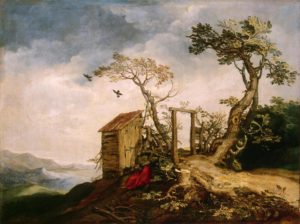Thoughts on Sunday’s Lessons for Aug. 12, 2018

Landscape with the Prophet Elijah in the Desert (1605-1615). Oil painting on canvas by Abraham Bloemaert (1566-1651). The State Hermitage Museum, St. Petersburg, Russia. (Click image to enlarge.)
The child born of David’s rape of Bathsheba has died, as God foretold through the prophet Nathan; and now we learn of the death of David’s son Absalom. In wildly dysfunctional dynamics of a Bronze Age royal family, Absalom had killed his half-brother, Amnon, for raping their sister, Tamar. Then Absalom went to war against his father, fighting to take over Israel’s throne. David’s soldiers find Absalom trapped in a tree, and kill him despite David’s command to deal with him gently. In spite of his son’s treasonous rebellion, David grieves him deeply. “O my son Absalom, my son, my son Absalom! Would that I had died instead of you, O Absalom, my son, my son!”
First Reading (Track Two): 1 Kings 19:4-8
When we are in trouble and despair, God provides us the physical and spiritual sustenance of the bread of life. This ongoing theme continues through this week’s Lectionary readings. In our first reading we find the Prophet Elijah torn by depression and fear. He has escaped the murderous anger of King Ahab and Queen Jezebel, who had threatened to kill him. But now, alone in the stark wilderness and deeply depressed, he lies down under a broom tree and asks God to let him die. Instead, though, God sends an angel to tempt Elijah with hot cakes and water and loving support. This restores Elijah’s strength, and he resumes his prophesying.
Psalm (Track One): Psalm 130
We often hear this Psalm of faithful hope in God; indeed, it has been only a few weeks since the last time it appeared in our readings! In the context of different readings, though, we may sense its verses in new and different ways. On June 29 we heard it alongside David’s grief at the death of his friend, Jonathan. Now we sing it in harmony with David’s grief over his son Absalom’s death. God’s love and grace wait for us even when we are deep in grief. We wait for God, even as in night’s darkest hours we wait for morning light.
Psalm (Track Two): Psalm 34:1-8
We will hear this Psalm, divided into three portions, in this and coming weeks. Tradition holds that David himself sang this Psalm after he had narrowly escaped death at the hands of King Abimelech of the Philistines. Appropriately, it is a song of praise and thanksgiving for God’s protection in time of trouble. In an unusual sensory metaphor that has been adopted in a contemplative Taizé chant, we “taste and see” that God is good.
Second Reading: Ephesians 4:25-5:2
“Do not let the sun go down on your anger.” In its life lessons for those who lived in community in the early church, this passage from the letter to the people of Ephesus speaks good sense to us all: Tell the truth. If you’re angry with your neighbor, work it out; don’t let anger divide you. Don’t steal. Work honestly, and share with those in need. Be honest, but be positive. Be gracious. Forgive one another. And at the end of the day, love each other as Jesus loves us, and try to live as Jesus would have us live.
Gospel: John 6:35, 41-51
The verse that ended last week’s Gospel is repeated as the first verse this week: “I am the bread of life. Whoever comes to me will never be hungry, and whoever believes in me will never be thirsty.” These words describe our hope in the Eucharist so clearly that we often sing them in the Fraction Anthem before Communion. Here, though, the crowd following Jesus starts to push back. Echoing the scene we heard in Mark’s Gospel last month, they challenge Jesus: They know him. They know his parents. They watched him grow up. Who is he to be talking like this? But Jesus stands firm, and will continue to do so as we stay with this Chapter of John for the next three Sundays. In Jesus we know God. Through Jesus, God is with us.
What are “Track 1” and “Track 2”?
During the long green season after Pentecost, there are two tracks (or strands) each week for Old Testament readings. Within each track, there is a Psalm chosen to accompany the particular lesson.
The Revised Common Lectionary allows us to make use of either of these tracks, but once a track has been selected, it should be followed through to the end of the Pentecost season, rather than jumping back and forth between the two strands.
For more information from LectionaryPage.net, click here.
